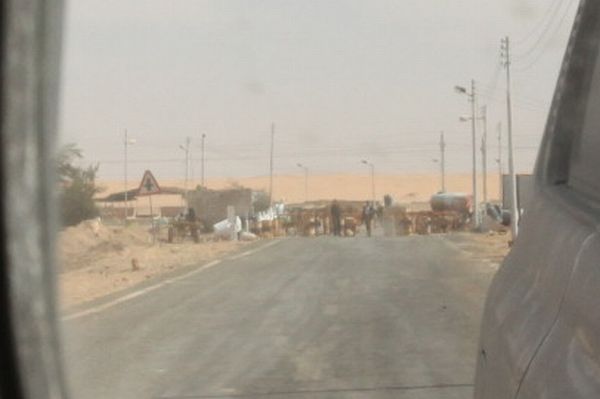Al Kharga, Egypt
A: I can’t seem to see the road you’re talking about on the map from Al Kharga to Aswan.
V: Zoom in a bit further. It’s a feint line but it’s actually a major road.. It starts at Jaja, just south of Al Kharga.
The next day at Al Kharga we’re welcomed by the local police, who take down the usual details. Five officers with four rifles, get in a car and decide to lead us through the back roads of Al Kharga to the road we needed to be on get to Aswan. If a truck gets in the way, the sirens are turned on and everything moves aside to let us pass. At the second check point we get handed over to police escort number two, who again make sure we take the correct roads. All in all, probably not a bad thing as we had been told of a few problems in Al Kharga and were keen to get through it.
60Km later we’re at the Jaja turn off. In front are four sets of metal barriers, a few old oil drums and a plastic orange cone. More details are noted, and the vehicle is given the once over. Nods of approval at the winch, spare tyres and GPS. We wait while the barriers are moved aside. We turn left to take the road to Aswan and the police officers remove another six sets of metal barriers, a few more oil drums and a set of metal spikes on the road! “No police, don’t stop. Aswan direct.” I’m beginning to feel slightly nervous about the journey we’re about to take.
A few hundred metres later, there’s an army checkpoint. A more modest affair with one set of barriers and a plastic cone. More details noted. “Permission”, he asks. “Err, visa, driving licence…?” “No, permission”.
We had been warned the previous day by Mohamed in Al Qasr that we may get stopped from taking this road if we were going to Luxor, and get diverted via Asyut, which has its own health warnings. “Be confident and insist on going through” we were told. In reality we wanted to go straight to Aswan and avoid Luxor so this was by far the most direct route to take, especially with unpredictable fuel availability.
After confidently asserting that we were going to “Aswan direct” and not Luxor, and had got permission from twenty or so police officers further back, a senior official eventually waves us through and the orange cone between us and Aswan is removed. Now I’m really beginning to wonder what the story here is.
Ven was right. This is a major road, running through the desert, and in excellent condition. However, along its 200km we only pass a couple of cars, occasionally cross the rail track and see a few deserted buildings. When we stop for lunch in the midday heat, we see nothing but the white desert rocks and the shiny black tarmac ahead of us.
I suspect that the reluctance in letting people travel on this road is that, in a highly policed country, there are no police checks on this road, no mobile signal and no people. In essence, if something happens, you’re pretty much on your own in the desert. I’m not quite sure this explains the various police escorts and number of barriers that had to be moved to get onto the road, but may at least explain the level of scrutiny our vehicle received at one of the checkpoints – at least we looked prepared. And it may also explain why Ven didn’t tell me any of this before we set off on this road, even though he already knew how few vehicles get onto it!

